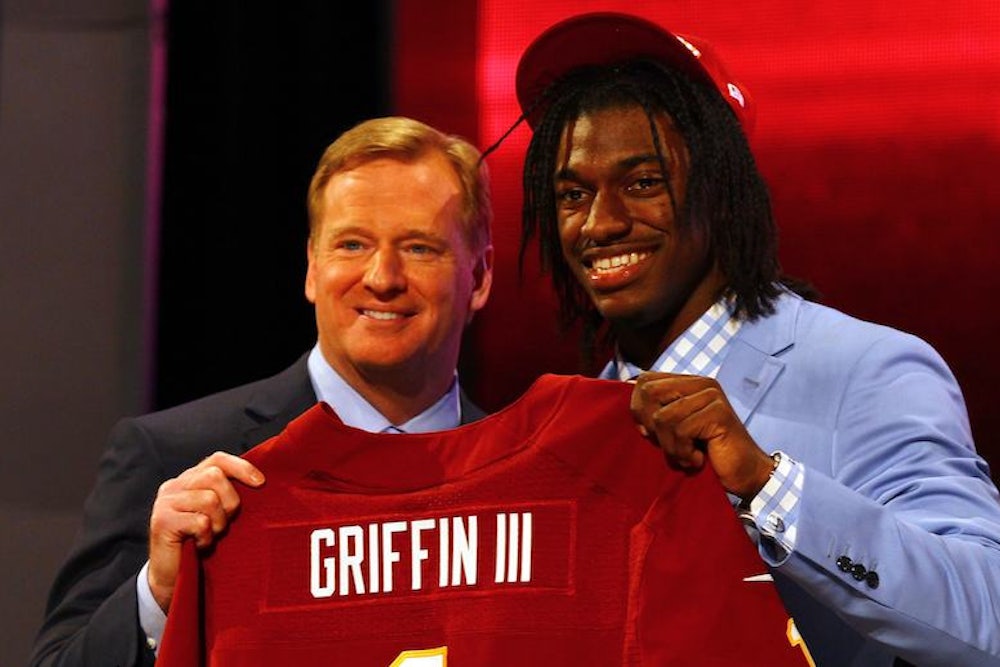When Barack Obama spoke out this week to criticize the Washington football team’s nickname, it made national news. But I suspect that, when this is all over, the more significant story will be a small one that popped up on the local news: Students at D.C.’s Wilson High School had asked the principal to ban the NFL team's clothing because it is racist against Native Americans.
Thus far, the controversy over the name has felt like a debate among elites: First, activists militate around an issue, employing lawyers in a doomed regulatory effort to force change (in this case, by trying to use antiracism rules to get the trademark nixed). Still, the cause makes it into the press, moving from margin (sports writers debating the name; copy desks eschewing it) to center (general-interest columnists opining about it). Politicians get involved. Naturally, the object of the criticism brings on high-priced crisis-PR talent, who argue that their well-intentioned client is misunderstood. Before long, someone has written a smart meta column about the ongoing media conflagration.
In the case of the Washington team-name controversy, the only major deviation from the script has been the franchise’s astonishingly bone-headed publicity campaign: Last summer, the team’s owner infamously told a reporter that “we’ll never change the name…NEVER — you can use caps.” A Snyder-produced TV show, meanwhile, trotted out a chief who declared himself honored by the team’s moniker. A subsequent report revealed that the unoffended Native American was not a chief, and probably not an Indian.
Last week, under the tutelage of Lanny Davis, the disreputable Washington hand known for representing unsavory third-world despots, Snyder released a letter to fans that was intended to showcase his softer side. The positive effects of the letter may have been undercut by its slipshod arguments. Note to Snyder: Saying that something has been around for 81 years, and is part of a venerable tradition, does not disprove the argument that it is racist. (Other note to Snyder: It’s harder to decry oversensitivity about offensive imagery when you yourself have lobbed phony-baloney claims of bigotry as part of a bullying, baseless lawsuit against a local newspaper—edited by me, as it happened—that wrote mean things about you.)
Still, even with the ham-handed flackery, I never figured the agitating would come to much. Snyder wants to keep the name, as do most fans, and if history has proven anything, it’s that the team owner doesn’t much care about the reproach of media elites—whether they’re complaining about losing seasons or about absurd efforts to wring more money out of fans.
The Wilson kids, however, are another story: When people who might buy team merchandise start worrying about whether it’ll get them sent home from school—or simply be regarded as tawdry or racist by passers-by—there’s a direct financial impact: National Football League merchandise licensing is a $3 billion a year business. Even a small bite into it represents serious dollars. (As the NFL has a revenue-sharing agreement, it also represents dollars taken from the pockets of Snyder’s fellow owners.)
For now, that’s a bit off into the future. The kind of kid who petitions the principal about racist t-shirts is probably not representative of the major current of teen culture; Snyder is surely right when he says in his letter to fans that he sees team logos, bumper stickers, decals, and t-shirts “wherever I go.” But youth culture changes fast, and today’s kids are tomorrow’s adults. What happens when you own a team whose merchandise is seen, even by five percent of potential consumers, as too distasteful to wear outside?
A high-priced PR operative can use the standard bag of tricks to parry the complaints of activists, journalists, and presidents—but Lanny Davis, or even a more sophisticated version of him, can’t shape the quiet retail decisions of tens of thousands of individual customers. When you’ve lost Maureen Dowd and Kathleen Parker, you have not yet lost America. But when you’ve lost the teenage retail market, you’re in deep trouble.
A savvier ownership, of course, would see this as an opportunity. Change the name and there will be a massive new market for merchandise bearing the new logo. And the goodwill generated by the decision may also keep people from noticing that the team is still raking in even more money by producing old-logo clothing for the nostalgia market.
